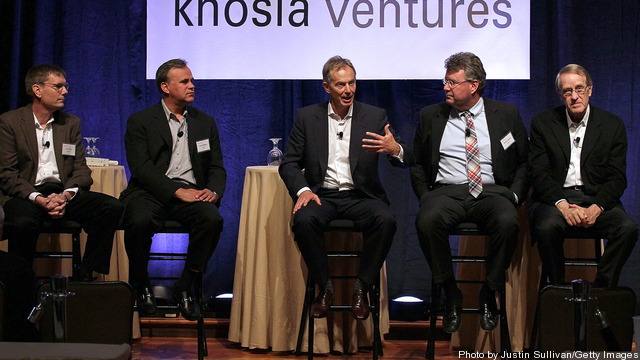 Soraa co-founder Steve DenBaars (2L), Calera CEO Brent Constantz (2R), and EcoMotors CEO Don Runkle (R) look on as former British Prime Minister Tony Blair (C) speaks during the Khosla Ventures Cleantech Discussion May 24, 2010 in Sausalito, California.
Soraa co-founder Steve DenBaars (2L), Calera CEO Brent Constantz (2R), and EcoMotors CEO Don Runkle (R) look on as former British Prime Minister Tony Blair (C) speaks during the Khosla Ventures Cleantech Discussion May 24, 2010 in Sausalito, California.
The cleantech market is a dynamic one, and market conditions affect available funds; a poor market inevitably affects business. Even though the second quarter of 2012 saw VC deals at their highest mark since 2001, green tech deal volume fell to a five-quarter low. Understanding this environment allows cleantech entrepreneurs to thoroughly prepare for investor pitches, acknowledge how their companies will address conditions, and forecast realistic revenues and market penetration.
For example, the solar market is depressed by low Chinese silicon prices, the wind market is stalled and renewable generation is not as hot as it once was. With a poor European economic status and many government incentives facing elimination in Germany, Spain and the U.S., the future of the space is unpredictable even a mere six months from today.
In addition to this uncertainty, investors lack confidence in cleantech firms partly due to the negative association of the term “cleantech” with such shortcomings as the bankruptcy of Solyndra and Abound Solar and slow pickup of electric vehicles. Since investors still seek out viable startups, it might be time for businesses to ditch the cleantech branding and emphasize a particular vertical, such as wind, biofuel, energy storage or other sectors to get positive attention from investors. No matter how cleantech executives label their companies, they need to address investors’ concerns and prove that their businesses will be profitable and worth investing in despite the weak market.
Confidence in Cleantech Breeds Job Creation, Retention
Despite the lingering global economic worries and investors’ glum outlook on the cleantech industry, optimism remains high among cleantech executives. A survey by research firm Grant Thornton found 68 percent of cleantech business executives expect revenue to increase over the next 12 months, while 62 percent also anticipate increased profitability. Confidence in the cleantech industry is high compared to the overall global sentiment.
Cleantech executives must exude confidence in order to build the same level of confidence with investors. Whether a company is in the early or late stage, the first step is to provide an overview of the strength of the market conditions. Investors want to know into which industries a company is selling and realistic growth forecasts. Companies must also address risks, whether they are related to technology or market execution. Investors will see through over-estimates, so cleantech executives must offer industry references and research citations to support claims. Confident, well-informed investors will put their money in cleantech companies, which in turn will encourage the companies to create more jobs in the industry and strengthen the domestic economy.
Job growth is a key part of bridging the perception gap between cleantech companies and the investment community. And when it comes to job creation, cleantech is heading in the right direction. Between 2008 and 2011, the Brookings Institution estimates that green jobs in the U.S. skyrocketed 260 percent from 750,000 to 2.7 million, driven by increased consumer awareness and demand. However, uncertainty, especially in the wind industry, spells potential loss in cleantech jobs. The White House reports that approximately 37,000 cleantech jobs in the wind industry could be lost if the wind power production tax credit (PTC) expires at the end of the year.
Ahead of any decision from Congress on renewing or allowing expiration of the PTC, wind turbine installations are stalling, projects are being delayed and workers are being laid off now. The last time the PTC expired, in 2004, new wind installations in the U.S. dropped 77 percent. In order to stimulate clean electricity generation, job creation and overall economic growth, Congress must renew the PTC and keep history from repeating itself.
The Future of Clean Technology
For clean technology to take off in the U.S., several things need to fall into place. The government must lead by example and demonstrate its faith in the industry. Cleantech executives must prove themselves and stand out from other industries and companies seeking funding. Only then might investors gain the confidence and willingness to dive back into the market.
Boosting the cleantech industry will support the U.S.’s renewable energy output and move the country toward energy independence. However, the goal is bigger than just one nation. As the industry grows, its goal remains the mainstream adoption of clean energy applications for a cleaner, more sustainable environment worldwide.
Mark McGough, president and CEO of Ioxus, Inc., joined Ioxus to establish the company as a high-volume manufacturer of ultracapacitor-based energy storage solutions. During three decades of leadership with technology and energy companies, including Pentadyne Power Corporation and Maxwell Technologies, McGough has established a track record of commercializing new technologies and growing revenue.
